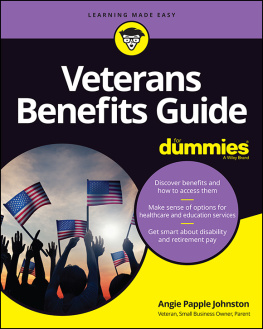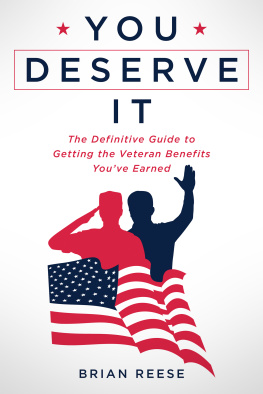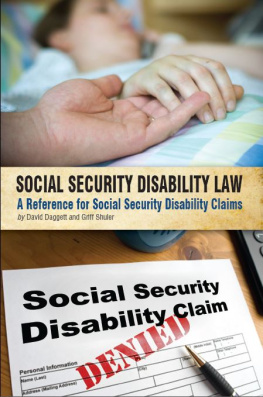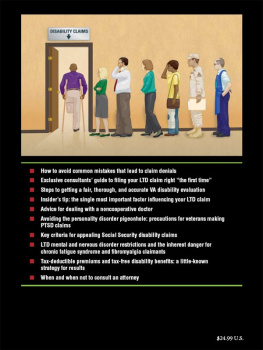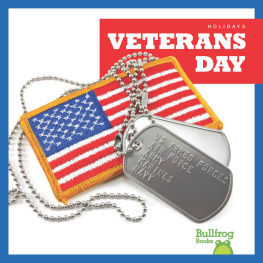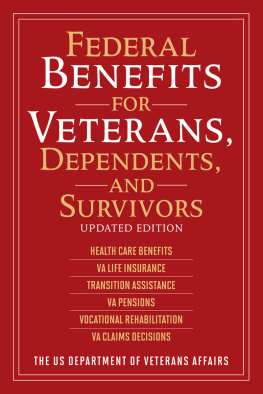ACKNOWLEDGMENTS
I owe a debt of appreciation to some very special people who volunteered their time and ideas to help me focus on the best methods with which to advise veterans on how to fight the VA in the trenches and make it count. First, let me say thank you to Robert Tralins, a fiction writer of action stories, with more than 250 covers notched on his pen, who always offered another idea to consider. Bob and I went to the mats with our fight for his VA benefits. We won.
To Dr. Susan Demers, LLB, Program Director, Legal Assisting, St. Petersburg College, Florida, who has an endless list of kudos as teacher of future litigators and advocates, as past president of the Clearwater Bar Association, and a commissioner on the Florida Bar Presidents Special Commission on Paralegal Regulations. My thirst to go for the jugular started when I enrolled in her program. Thanks Susan for all of your fantastic ideas.
Finally, thank you to Attorney John E. Tuthill, who I met when we were defending the rights of the same veteran. I was impressed with his passion to help veterans. His practice in St. Petersburg, Florida, deals with family, criminal, military, and veterans law. John is a retired captain, U.S. Navy JAG Corps, who served thirty-three years and was one of the navys first two reserve appellate judges serving in Washington, D.C. He was twice awarded the prestigious Pinellas County Victim Rights Coalition award.
To my wife of more than five decades, Patsy, I send love and bouquets forever. Thank you for always being willing to read my manuscripts and tell me when I get off course.
ABOUT THE AUTHOR
John Roches involvement as a veterans advocate began nine years before he retired from the U.S. Air Force. His VA actions on behalf of retired military personnel came to the attention of the St. Petersburg Regional Offices adjudication officer when, as a casualty assistance officer, he successfully argued for a widow that her retired Air Force officer husbands accidental death in the county jail was service-connected.
Immediately after leaving the air force, Roche joined the VA Regional Office adjudication division as a claims specialist. During the three years that he was with the VA, he completed its 1,560-hour formal training program and gained considerable insight into why so many claims were denied. Veterans did not know how to prove their claims; they relied on the VA to do it for them.
His decision to leave the VA was fostered by policies that contradicted the reason he accepted the job. Since leaving the VA, Roche has used his knowledge of the system to help more than forty thousand clients during the past thirteen years as a county service officer. Health reasons caused him to step down as an active veterans advocate with the county service in 1996.
Roche is a published writer specializing in veterans issues and has four forthcoming books on the subject. He has written five books focusing on how to get claims approved. His books have introduced him to veterans from all over the United States who have had legitimate claims denied.
Mr. Roche is a lifetime member of the Disabled American Veterans, National Association for Uniformed Services, and the Military Officers Association of America. He is also a member of Congressman Michael Bilirakiss advisory board. He lives in Palm Harbor, Florida.
THE APPEALS PROCESS:
STEP BY STEP
THE SUBSTANTIVE APPEAL
You have the right to appeal your claim!
Veterans Affairs would like you to believe that appealing a decision is nothing more than submitting the VA Form 9 Substantive Appeal, which briefly states the reasons why you are refuting the VAs decision. Accepting this premise will guarantee a two- to three-year wait for the Board of Veterans Appeals (BVA) to rule on your appeal. The odds are against BVA affirming your appeal.
However, the VA can be successfully challenged. To do so you must know the basics:
The VA often sends out letters that are confusing to the veteran.
Very seldom will a veteran have copies of all the evidence in his or her claim file.
Compensation and Pension Examinations (C&Ps) are often flawed.
A Statement of the Case contains only the VAs interpretation of the evidence.
Most claims are decided by an individual rater rather than by more than one adjudicator.
Many times a VA decision is based on conjecture rather than on hard evidence.
Rating Officers do not have the professional medical and legal backgrounds necessary to understand the complexities of rating the residuals of an injury or illness.
Rating Officers and Decision Review Officers often fail to follow prescribed protocol when deciding a claim.
Adjudicators tend to disregard statements from lay persons or the appellant when deciding the claim.
Adjudicators often disregard circumstantial evidence supporting a veterans claim.
The U.S. Court of Appeals for Veterans Claims (CAVC) has shown that the VA has demanded the burden of proof from the veteran, which exceeds the intent of the law.
Remember, the VA is a bureaucracy:
a large, complex administrative structure. These structures exist in organizations such as governments and businesses with a hierarchy of bureaus and agencies.
a formal organization with defined objectives, a hierarchy of specialized roles and systematic processes of direction and administration.
a system in which people are expected to follow precisely defined rules and procedures rather than to use personal judgment.
The most important thing is to not quit in frustration.
STEPS OF THE APPEALS PROCESS
Claim filed 
Claim decided (denied) 
Veteran disagrees with the decision 
Notice of Disagreement submitted 
Statement of the Case is issued 
Substantive Appeal completed 
Veteran requests a hearing 
Hearing with Board of Veterans Appeals conducted 
Decision made
WHY THESE EXAMPLES ARE IMPORTANT
Examples are provided for you so that you can present your appeal arguments in complete harmony with the statutes, regulations, and case laws. Framing your appeal based on the supportive second-tier level of evidence will warrant granting service connection for the disability or disabilities claimed. No matter how well supported and organized your presentation, Regional Office adjudicators are known to ignore your arguments and let the Board of Veterans Appeals decide the merits of the appeal.
Keep in mind that for the VA to prevail it must produce medical evidence, other than the departments unsubstantiated opinion, from an outside source that reflects a preponderance of evidence against your claim. Further, the VA must be able to explain exactly why its evidence negates the evidence you have furnished.
Going Forward
You have already made the most important decision: to appeal the denial of your claim for disability benefits. Now a thousand questions go racing through your mind:


